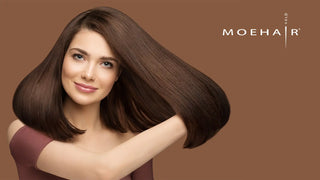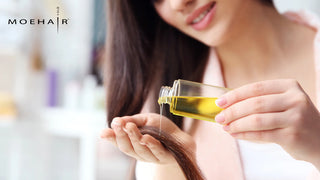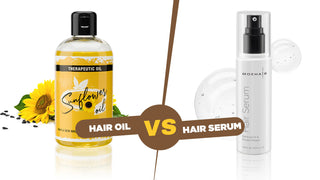 Table of contents
Table of contents
Nourished, healthy hair symbolizes beauty and vitality, and we all aspire to have vibrant, soft, shiny locks. However, factors like pollution, heat styling, and nutritional deficiencies can take a toll on your hair's health, leading to issues like dryness, breakage, and dull hair.
Our hair is often considered our crowning glory, but what happens when it loses its shine? Dull hair can be frustrating and may dampen your overall appearance and self-confidence. Fortunately, understanding the reasons for lifeless hair and implementing the proper treatment strategies can help you restore its luster. This blog post will explore the common causes of dull hair and provide effective solutions to restore your hair's natural radiance.
Causes of Dull Hair
Lack of Moisture
One of the prime causes of dull hair is insufficient moisture. When your hair becomes dehydrated, it loses its natural shine and becomes more prone to breakage. In addition, factors like overexposure to the sun, excessive use of heat styling tools, and harsh hair products can strip your hair of its moisture, resulting in lifeless locks.
Product Build-Up
Using an array of hair products like shampoos, conditioners, styling gels, and serums can contribute to product build-up over time. This residue accumulation can weigh down your hair, making it appear dull and lifeless. Improper cleansing or infrequent clarifying can exacerbate the problem.
Nutritional Deficiencies
Other dull hair causes come under the health of your hair which is closely associated with your overall well-being. A diet lacking essential nutrients, such as vitamins, minerals, and proteins, can negatively impact your hair's appearance and cause significantly dull hair. Nutritional deficiencies can lead to weak, dull hair that lacks vitality.
Environmental Factors
Exposure to environmental elements like pollution, chlorine in swimming pools, and hard water can take a toll on your hair's health. In addition, these external factors can strip away natural oils, leaving your hair dry, damaged, and dull.
Treatment
Hydrate and Nourish
Moisturizing your hair is key to combat dull hair causes. Go for hydrating shampoos and conditioners that are specifically designed to replenish moisture. Consider incorporating a weekly deep conditioning treatment or hair mask for intense hydration. Natural ingredients like coconut oil, shea butter, and argan oil can restore shine and softness.
Clarify Regularly
To eliminate product build-up and restore your hair's natural shine, clarify your dull hair regularly. Use a clarifying shampoo once or twice a month to remove any residue or impurities weighing your hair down. This will promote better product absorption and allow your scalp and hair follicles to breathe.
Balanced Diet
Another way to eliminate the causes of dull hair is to ensure your hair's health from within by consuming a balanced diet rich in vitamins, minerals, and proteins. Include foods like leafy greens, eggs, fish, nuts, and seeds, which provide essential nutrients for hair growth and strength. If necessary, consider incorporating supplements after consulting with a healthcare professional.
Protect from Environmental Damage
Shield your hair from environmental factors by taking preventive measures. For example, cover your hair with a hat or scarf when exposed to excessive sunlight or harsh weather conditions to protect your hair from various dull hair causes. One way to ensure is that before swimming, wet your hair and apply a protective leave-in conditioner to minimize damage from chlorine or saltwater. Additionally, consider using a water filter to combat the effects of hard water, as this could be a detrimental cause of dull hair.
Deep Conditioning Treatments
Indulge in deep conditioning treatments once or twice weekly to nourish and repair your hair. These treatments penetrate the hair shaft, replenishing moisture and restoring shine. Look for products containing ingredients like argan oil, shea butter, or keratin for their revitalizing properties. In addition, coconut oil can be used as a deep conditioning treatment for dull hair as a natural alternative.
Minimize Heat Styling
Excessive use of heat-styling tools can cause damage and dullness. Whenever possible, embrace your hair's natural texture and limit heat styling. If you must use heat, apply a heat protectant spray beforehand to minimize damage. Opt for lower heat settings and give your hair regular breaks from styling to allow it to recover and rejuvenate.
Regular Trims
Split ends can give frizzy, dull hair and are unkempt. Schedule regular trims every 8-12 weeks to eliminate split ends and maintain healthy hair. Trimming helps prevent breakage, promotes hair growth, and keeps your locks looking fresh and revitalized.
Avoid Overprocessing
Chemical treatments, such as coloring, perming, or relaxing, can take a toll on your hair's health. In addition, overprocessing can lead to dryness, breakage, and lifeless hair. If you choose to undergo these treatments, follow proper aftercare and use products specifically designed for chemically treated hair.
Dull hair can result from various factors, but with the proper care and treatment, you can restore its natural radiance. You can transform your dull locks into vibrant, healthy tresses by addressing moisture levels, eliminating product build-up, ensuring proper nutrition, and protecting your hair from environmental damage. Embrace these strategies, and watch your hair again become your shining glory! Remember that everyone's hair is unique; finding a routine that works best for dull hair is essential. If you have specific concerns or conditions, it's always a good idea to consult a professional hairstylist or a dermatologist for personalized advice.
How we reviewed this article:
Our experts continually monitor the fashion and beauty space, and we update our articles when new information becomes available.
-
Current Version
-
May 22, 2023
Written By -
Upasana Kakati is a lifestyle writer with 7+ years of experience in writing in the beauty and haircare industry.
Edited By -
Saima Ahmed with 8+ yrs of experience, specializes in crafting engaging content focused on Hair care, lifestyle, and beauty.






















